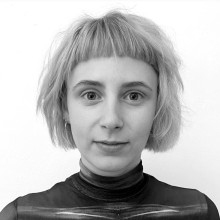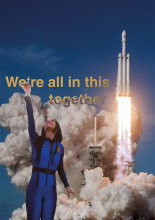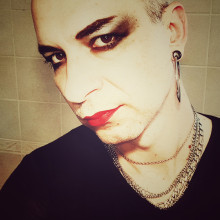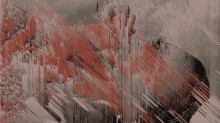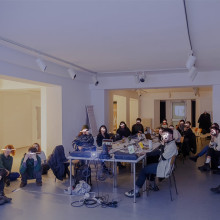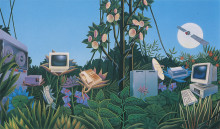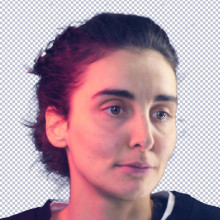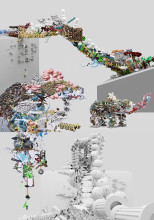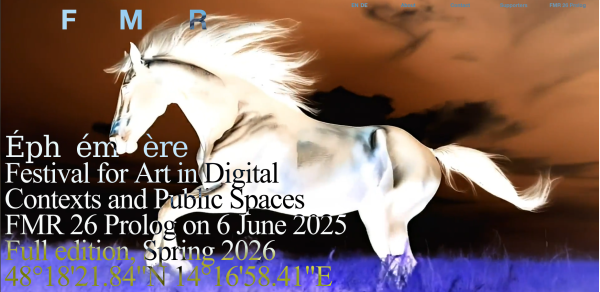
On Friday, 6 June 2025, a prolog to FMR 26 will take place around Linz Schlossberg. Starting at 2 p.m., the event will present initial ideas and concepts developed by FM[Ai]R-26 residency artists and students from the University of Arts Linz, offering a first glimpse into the upcoming regular edition of LINZ FMR, scheduled for June 2026. The program includes lectures curated by → Davide Bevilacqua / → servus.at and sound art and concerts curated by → qujOchÖ.
Program:
2 – 3pm: Opening & Welcome (Schlossmuseum Entrance West)
3 – 8pm: Presentations & Lectures (around Schlosspark)
8 – 12pm: Sound Art & Concerts (Schlosspark Castle Wall Northwest)
FMR 26 Prolog Lecture Abstracts and Bios
Anna Kraher
What a Wonderful World: Big Tech and the Politics of Isolation
This talk explores how Big Tech’s vision of the future—from privatized cities and space colonization to doomsday bunkers—reflects a growing ‘Politics of Isolation’. These projects signal the tech elite’s departure from a shared common ground: corporate-run territories as retreat from legal and regulatory frameworks, bunkers as escape from ecological limits, and space colonization as detachment from Earth itself. In this worldview, freedom is imagined as an escape from responsibility and the collective.
Yet, these isolationist strategies rely on global systems of labor and environmental extraction. What appears as isolation is, in fact, an exploitative relationship. This echoes right-wing ideologies, that promise belonging by drawing borders and claim common ground where there is exploitation. At its core is a liberal concept of freedom–rooted in property rights, unrestricted mobility, and withdrawal from collective responsibility.
For tech elites, this suggests an escape route from a world in crisis, while the majority are left to confront a collapsing planet. In contrast, the ‘freedom to stay’ requires the preservation of a collectively habitable world, where we have the right to remain present.
Anna Kraher (she/her) is a researcher working at the intersection of critical philosophy, media theory, and the arts. Her academic and artistic practice explores the societal implications of artificial intelligence (AI) and Big Tech, with a particular focus on the interplay between AI ideologies, predictive analytics, and temporalities. She is currently a research assistant in the Ethics and critical theories of AI research group at the University of Osnabrück. She studied Design & Computation, Computer Science, and Gender Studies in Berlin. → Anna Kraher
Valerie Messini
Against the Flat Net: Affective Interfaces and Dimensional Archives
The talk critiques the contemporary internet – often labeled Web 2.0 – through a media-theoretical lens informed by the notion of media-centric perception, affect theory, and cyberpunk imaginaries, tracing the trajectory from early net optimism to today’s algorithmic capture. Where once the internet was a portal to a consumption-free space, shaped by programmers, we are now shaped by opaque interfaces designed for control, distraction, and extractive engagement.
I propose an alternative: spatial, multi-user, and more sensorially integrated interfaces that reconnect physical and digital space, in opposition to defaulting to the flatness of doomscrolling feeds and user passivity. Rather than just critiquing the evil algorithms, I want to draw attention to the interface – rethinking navigation, access, and interaction.
Drawing on artistic and speculative approaches, I envision a digital virtual space that is less about consumption and more about situated, affective co-presence – an archive that can be moved through like a space, shared in real time, and felt through interface rather than only seen. A radical meeting space – capable of collapsing vast distances and dissolving social hierarchies, where identities could be fluid and encounters unbounded by physical or institutional constraints. This is both a critique of current paradigms and a call for designing otherwise.
Valerie Messini is a registered architect, digital artist, and Postdoctoral Senior Scientist at the Weibel Institute for Digital Cultures, University of Applied Arts Vienna. Her research explores the impact of digital technologies and design tools on space, identity, and perception, with a focus on immersive media, virtual environments, and the concepts of nothingness and digital nature. She completed her PhD „void set – about emptiness in virtual space“ in 2024, under the initial supervision of Peter Weibel and later Clemens Apprich. She has published in international journals and presented her work at conferences across Europe. Valerie graduated with distinction in architecture from the University of Applied Arts Vienna (Studio Prix) in 2011. She has worked as a design architect for renowned international firms including Coop Himmelb(l)au (AUT), Snøhetta (NO), and Flying Elephant Studio (IN), and collaborated with artist Eva Schlegel on large-scale installations. In 2017, she became a licensed architect (ZT). In 2018, she co-founded 2MVD, an artistic collaboration with Damjan Minovski that merges architecture with innovations in digital art and technology. Their work has been exhibited internationally in museums, galleries and at festivals. Since 2013, Valerie has been teaching with a focus on emerging digital artistic strategies, in addition to organizing excursions and events, and occasionally curating exhibitions. → Valerie Messini
Luka Prinčič
trans.fail/combodagen
trans.fail is an audio-visual conceptual and artistic framework: a glitchy hybrid performance sourcing data and transfiguration from number of channels: media-oversaturation, home-made software, sonic explorations and visual algorithms, hacks, glitchings, and number of thematic interests in the background: slavic-romani myth-futurisms, gender fluidity, imperialism, media theories, praxis and artistic critique of digital capitalism.
/combodagen is a further complication of the existing conceptual framework with questions of community, body, and agency in a livecoding a/v performance. The role of self-organized community of autonomous agents in a decentralized and federated network is crucial and vital to "liveness" of livecoding as an art form.
Luka Prinčič is a musician, sound designer, and media artist. They have been writing music, creating sound art, performing, and manipulating new media in various ways since the mid-90s. They specialize in computer music, elaborated funk beats, immersive soundscapes, incidental music for live arts and video, and digital media experiments. Their livecoding performance has been described as „an experience of pure computer music, drawing on the heritage of IDM and contemporary experimental currents, creating cinematic ambient soundworlds that evoke a sense of loneliness in cyberspace.“ (J. Bužinel). As a veteran of the Slovene breaks and bass club scene they have been laying down mixes on a spectrum from breakbeat to uk bass and beyond, organizing night events in the Slovene capital Ljubljana since the late 90s. They performed at festivals like Iklectik (London), Ars Electronica (Linz), EMAF (Osnabrueck), Netmage (Bologna), MENT (Ljubljana), and Trouble (Brussels), worked at Ljubljana Digital Media Lab (Ljudmila) and local hackerspace CyberPipe (Ljubljana), collaborated with local international feminist festivals like City of Women and Red Dawns, exhibited at Kapelica Gallery, Museum of Modern Art, and MSUM Ljubljana, and traveled with their work all across Europe and further. Luka Prinčič is passionate about free software, science fiction, social awareness, critical expressions, and the peculiarities of the contemporary human condition. They work at the Emanat Institute and run Kamizdat, a boutique netlabel for adventurous music, in Ljubljana, Slovenia. → Luka Prinčič
REINCANTAMENTO
A Road to Nowhere: Stories of Techno-Escapism
What happens when exit fantasies become world-building projects? From digital nomads cultivating neo-rural dreams to billionaires bootstrapping network states, REINCANTAMENTO maps the techno-phantasies of exit. Drawing from their research on digital gardens, the collective Investigates whether these new frontier mythologies offer genuine autonomy or simply transplant existing power structures into new territories, virtual and physical.
Based between Berlin and Italy, REINCANTAMENTO is an independent collective of researchers, philosophers, and designers dedicated to exploring the intricate entanglement between technology, magic, and society. REINCANTAMENTO adopts imaginative practices, autonomous publishing, and critical game design as tools to dismantle dominant techno-political structures and create new sites of enchanted hope. We embrace the precarious nature of cultural work and consider our project as an eternal Work-In-Progress. As a choir of plural voices, REINCANTAMENTO refuses the identity trap and considers itself part of a wider, common horizon for alternative, networked futures. Their projects have been featured at Serpentine Galleries & RadicalXChange, SAVVY Contemporary, NYU Design and Media, C/O Digital Festival 2022, MoCa, MacTe, AMRO FEstival, 48h Neukölln Festival 2023, MANIFEST:IO, IAM Festival 2021, and different online outlets. Alessandro Y. Longo is a philosopher and researcher based in Berlin. Alessandro’s research explores subversive uses of technology, cooperative economic models, and cultural mutations in the age of digital networks. He is the founder of REINCANTAMENTO, a research and publishing collective that mobilizes imaginative practices and critical game design methodologies as tools for investigating dominant techno-political architectures, aiming to create spaces of utopian possibility and enchanted desires. Anna Fasolato is a Berlin-based cultural manager and researcher with a background in cultural and media studies. Her research focuses on the privacy and data protection risks emerging from the rapid digitalization of everyday life. In 2024, she was awarded a fellowship at the University of Turin, contributing to a project investigating the impact of AI on education. She is currently involved with SAVVY Contemporary, a cultural and community art space in Berlin, as a project manager and administrative assistant, exploring non-hierarchical forms of organisation and decision making. → REINCANTAMENTO
~~~
The artists, researchers and musicians involved in FMR 26 will also take part in the FMR 26 Prologue:
- FM[Ai]R-26-Residency-Artists: Clair Bötschi (DE), Selma Kjesen (SE), Lila Rui Lan (CN), †een▲ge g☺d (FR) and YuFu (CN).
- University of Arts Linz, Department of Sculptural Conceptions / Ceramics (directed by Sarah Decristoforo and Frank Louis): Jacob Bartmann, Magdalena Berger, Leonie Brunner, Ivy Deacon, Sonnhild Essl, Jieun Kim, Elena Lengauer, Caroline Lerbro, Lisa Maier, Katharina Mitter, Maria Nalbantova, Mani Ramhormozihoseinizadeh, Louisa Roubik, Helena Sekot, Yao Wang and Melanie Winter.
- University of Arts Linz, Department of space&-design-STRATEGIES (directed by Andrea Curtoni, Giulia Mazzorin and Felix Vierlinger): Moritz Gregor Böttjer, Cecilia Bojanic, Leonardo Cattaneo, Viktoria Hauser, Xiling Huang, Kaya Lackner, Tobias Spinka, Rebecca Strasser-Kirchweger, Charlotte Vetter and Chuming Yu.
- University of Arts Linz, Tangible Music Lab – Sound and Space Class (directed by Florian Goeschke): Ksenia Bakhtina, Sam Bereliani, Saumil Bhandari, Gerold Brunner, Mobina Doost, Gundega Graudina, Andreas Gruenauer, Jonas Hammerer, Hanna Kitter, Maria Pae, Lilith-Isa Samer, Boris Shershenkov and OMZOL.
- Lectures by Anna Kraher (AT), Valerie Messini (IT), Luka Prinčič (SI) and REINCANTAMENTO (IT/DE).
- Live- and DJ-Sets by QOA & Primeiro (AR), Voiler (AT) and I-ID (IR).
~~~
LINZ FMR is a biennial festival and format for artistic processes and positions, that reflects the ephemeral nature of our digital and connected present. The ever-advancing digitalization of everyday life implies an intense overlapping and layering of familiar physical, but also finely interwoven digital spaces. LINZ FMR focuses on the shifts, distortions and rifts that arise in this process and presents current artistic positions in this context.
The festival, whose title alludes to ephemerality and short-livedness, presents works whose initial ideas can be found in virtual and/or digital space or have a strong reference to it, but are shown (sometimes in a transformed way) in the physical surroundings of the city of Linz. The focus is primarily on the interstices that arise during these transformations into public space—outside of museums, galleries or art spaces.
Responsible for the festival is the association “LINZ FMR—Art in digital contexts and public spaces”. It was founded by the two art and cultural initiatives → qujOchÖ and → servus.at, → Atelierhaus Salzamt of the city of Linz, → University of Arts Linz and → Sturm und Drang Galerie. Their representatives have been involved in the conception, organization and curation of the festival since its first edition in March 2019.
LINZ FMR is supported by the City of Linz as UNESCO City of Media Arts, the State of Upper Austria and the Federal Ministry for Arts, Culture, the Civil Service and Sport, as well as numerous organizations and companies.

